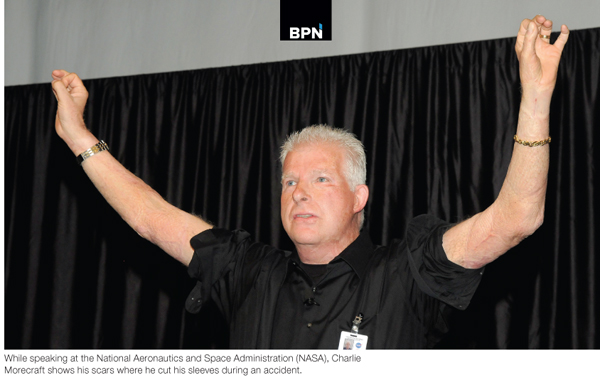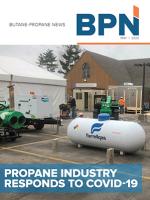
A DECISION TO MAKE A DIFFERENCE
Nearly seven years had passed since the accident and Morecraft was back to work at Exxon in a new role as a union safety coordinator. Having been through all that he had, he was often irritated by the employees who slept through safety meetings and took the same lax attitude toward protective safety glasses and clothing that he once did. “One day, I was frustrated with three guys who just refused to wear their safety helmets,” he said. “Instead of my usual admonishments that were clearly not working with these guys, I was very frustrated. And one of the guys snapped back at me, ‘Charlie, you never gave a damn about safety and you don’t today!’” At that point, I was mad and had those three guys sit down and I told them my entire story of the accident—the horrors of the screaming in the hospital by all of the burn victims going through excruciating pain, the depression, the alcoholism, the effects of the entire experience on my wife and daughters, including the drug and alcohol abuse of my daughters.” After the story, all three of the employees walked away wearing their safety helmets. He will always remember that one of the employees, Eddie, turned around and said, “Charlie, you ought to tell that story to everybody!”
That night, after telling his story to the three employees, was the first night he slept through the night without a nightmare. “I think that after the endless trauma of the accident and everything that followed in the fallout, I felt a sense of purpose that my story had an impact on these employees,” he said. “This began a next phase of my life that continues to this day—sharing my story to change a culture of machoism and neglect.” After disappearing for a few days, Morecraft found himself at Yosemite National Park. In awe of the view at Glacier Point, he cried and reflected on how he could move forward, taking responsibility for his own life while helping to guide others to take responsibility for their lives.
TAKING A POWERFUL STORY TO THE MASSES
The decision to make a difference changed life dramatically for Morecraft. He has traveled throughout the United States and the world speaking to audiences of all sizes. “I’ve been to Russia, Kuwait, and throughout the Middle East,” he said. “I’ve been to Siberia, Europe, and many, many more countries. Despite all the stark differences in culture, religious belief, and way of life, all people have some universal characteristics. They want to come home from work, watch TV, have a beverage, and enjoy life with their family.” With his video now available in 38 languages, Morecraft believes his message of taking safety seriously for the good of the entire family resonates with his audiences. “Who has ever changed their behaviors because someone gave them a ‘Work Safe’ T-shirt?” he asked. “And believe me, they don’t care what their CEO says or thinks. But, a story about the devastating effects of being severely burned and the effects this can have on their family gets their attention.
“I have had over 200 grown men, big macho men, faint during my presentation over the years,” Morecraft said. “Children and women actually hold up better than the men, and I believe it is because the men are often more likely to be working in these industrial situations and ignoring the safety protocol. I’ve had men tell me they relate because they see themselves in my position, but the accident simply has not happened yet. They are overcome by the sense that they are vulnerable unless they make a change and make it now!”
While Morecraft always tells the story of the accident, another account from his first year on the job is also frequently told. This one is about a major ammonia leak that caused him to put on respiratory equipment. “What are you doing? Going swimming?” a superior asked. Morecraft took off the respiratory equipment and joined the others who went to take care of the leak without safety wear. “The whole way back, we held our breath while inhaling fumes. It caused me to gag and vomit,” he said. The superior simply said, “Good job, kid.” Morecraft tells this story to illustrate the peer pressure that often exists to neglect safety protocol. “Honestly, I didn’t wear the safety glasses because I didn’t think I looked good or cool wearing them. I worried what others thought,” he said. “That set me up for a life of horrible problems, and for what? Concern that I wouldn’t look cool enough in safety glasses!”
“WHAT MAKES YOU THINK YOU ARE DIFFERENT?”
A frequent question Morecraft asks in his presentation is, “What makes you think you are different?” He believes that everyone who fails to wear the protective gear, takes shortcuts around safety rules, or flat out ignores safety guidelines is setting themselves up for an accident like his. “What makes you think you are different?” he asks his audience. “Why is this never going to happen to you?” He tells his audiences about the details of treatments that are severely painful. “There is a process of peeling off dead skin so that there is a fresh, clean area for skin grafts,” he said. “When you come out of the tank, the air hits nerve endings and causes an excruciating level of pain. I grew up a tough kid who never thought he would scream or cry. That all changed fast with burn treatments. It is horrible to go through it. I used to try to strategically time my morphine treatments to cause the least pain, but it was always terribly painful. It was painful to hear others scream as well.” Morecraft wants people to know the horrors they could face by taking risks. This then ties to the story that he considers worse: the story of how his family was affected.
In addition to speaking to large groups, Morecraft has been a frequent visitor to burn treatment facilities to offer moral support to others going through what he has gone through. “It never gets easier. For these people, they think their lives are ruined,” he said. “Young women and young men think they will never be attractive to the opposite sex again. Life as they know it is over. There is so much they are not sure they will be able to ever do again. I can relate, having been through this.”
ACCIDENTS HAPPEN IN MANY FORMS, AT WORK AND HOME
Morecraft points out that accidents he talks about are not all like his. “My accident is just my story. Accidents can happen at work, during travel, at home, and about anywhere else,” he explained. “I talk to young people about using cell phones and texting while driving. So many young lives are lost each year and for what? A message that can always wait just a few more minutes.” He points out that young people often think they are invincible and that no injury or death will come to them. He has counseled families of burn victims. “Accidents in the home are often the worst. Children often get burned due to the negligence of the parents. I’ve seen incidents where a parent feels so guilty over the painful injury or death of a child that they later commit suicide.”
“There are many injuries that take place in the home because people misjudge the power of fuel,” Morecraft said. “Even turning on a gas grill can sometimes get people caught in the flash during ignition. Smoking near an ignition source is a big mistake too many people make. Having ignition sources too close to tiki torches at a party can cause a tragedy. Cannisters with a small leak can cause vapors to escape from a hole. Abusing tanks in any way, like letting them bounce around too much in a truck, can cause an explosion. These are just some key negligent mistakes that end up causing serious injuries and death.”
Today, Morecraft is remarried and semiretired. “I still go talk to groups about twice a month,” he said. With much of the country grounded by the coronavirus as he spoke with BPN, he pointed out that taking the precautions experts recommend is one more important step in daily life. “Washing your hands, social distancing, staying at home—all of the recommendations are so important,” he said. “I’m getting close to the age group that is least likely to survive this virus.” As a member of the board of directors of Vets Helping Heroes, he also has worked to raise money to provide service dogs for veterans who need them. There are dogs that simply provide comforts, dogs that can detect an imminent seizure with 10 minutes’ notice, and seeing-eye dogs for the visually impaired.
Morecraft deeply regrets the August 1980 accident that caused so much physical and emotional pain, but he is pleased that his decision to make a difference in the lives of others has been so successful. “I can tell people to put on safety glasses, gloves, and flame-retardant wear; I can tell them to follow all sorts of safety guidelines, but people are naturally resistant to being given orders to do something they don’t want to do,” he said. “So, instead, I tell them my story and sincerely express my concern for their well-being and the well-being of their family. That message seems to resonate much better to make people take safety precautions seriously. I call my session ‘Remember Charlie,’ but not so they will remember me personally; I want them to remember what happened to me and take action to not let a similar incident happen to them!” — Pat Thornton


